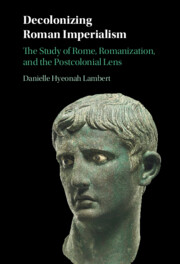Book contents
- Decolonizing Roman Imperialism
- Decolonizing Roman Imperialism
- Copyright page
- Dedication
- Contents
- Acknowledgements
- Introduction
- Chapter 1 The Discourse on Romanization in the Age of Empires
- Chapter 2 Postcolonial Themes
- Chapter 3 Postcolonial Questions in the Age of Decolonization
- Chapter 4 Towards a Paradigm Shift in the Age of Globalization
- Historical Intervention
- References
- Index
Chapter 1 - The Discourse on Romanization in the Age of Empires
Published online by Cambridge University Press: 03 October 2024
- Decolonizing Roman Imperialism
- Decolonizing Roman Imperialism
- Copyright page
- Dedication
- Contents
- Acknowledgements
- Introduction
- Chapter 1 The Discourse on Romanization in the Age of Empires
- Chapter 2 Postcolonial Themes
- Chapter 3 Postcolonial Questions in the Age of Decolonization
- Chapter 4 Towards a Paradigm Shift in the Age of Globalization
- Historical Intervention
- References
- Index
Summary
This chapter traces the origin of the Romanization framework: that is, how the discourse on Romanization sprang up and has taken root in early twentieth century scholarship. Professionalization of the discipline mixed with the deep-rooted gentlemanly tradition stirred new dynamics. Views on Roman imperialism ranged from those of British imperial civil servants to those of American professional academics; approaches varied from the old gentlemanly tradition of exemplary history to new professional academics’ critical history; and evaluations diverged from admiration to disapproval. Despite wide-ranging differences, none escaped from their own social, economic, and political surroundings shaped by European and American imperialism. The comparisons between the ancient Roman Empire and the contemporary British, French, and American empires, either overtly or covertly, underpinned the works of the time.
Keywords
- Type
- Chapter
- Information
- Decolonizing Roman ImperialismThe Study of Rome, Romanization, and the Postcolonial Lens, pp. 15 - 50Publisher: Cambridge University PressPrint publication year: 2024

